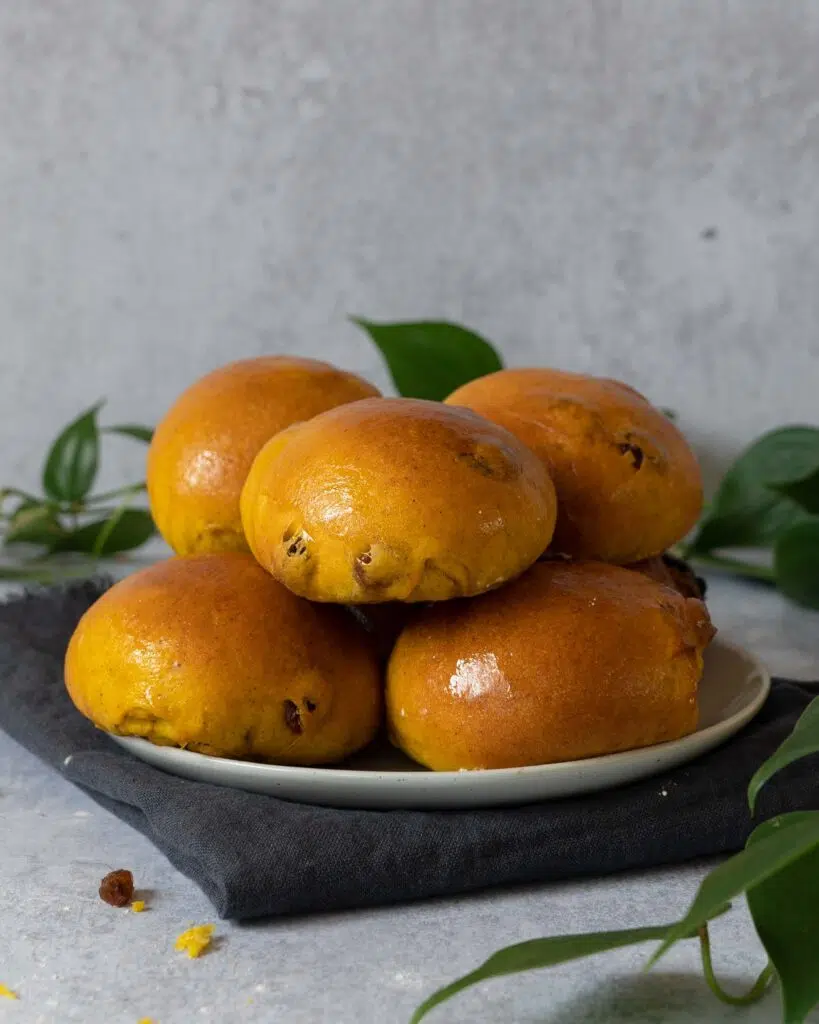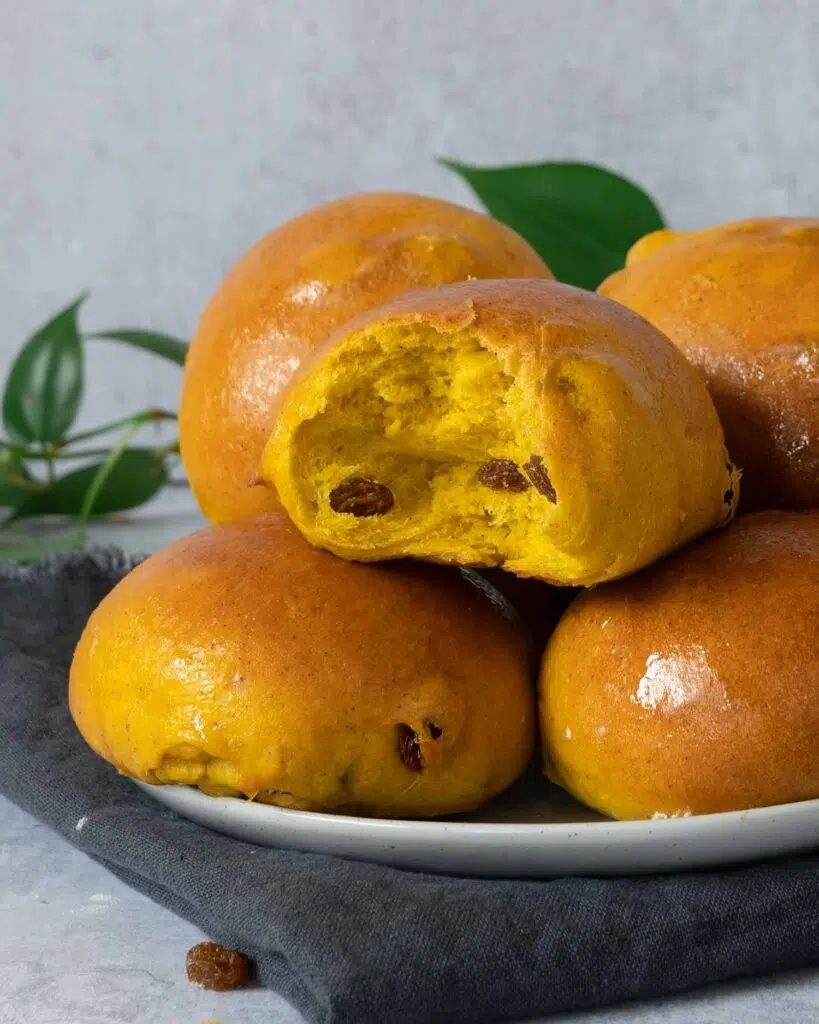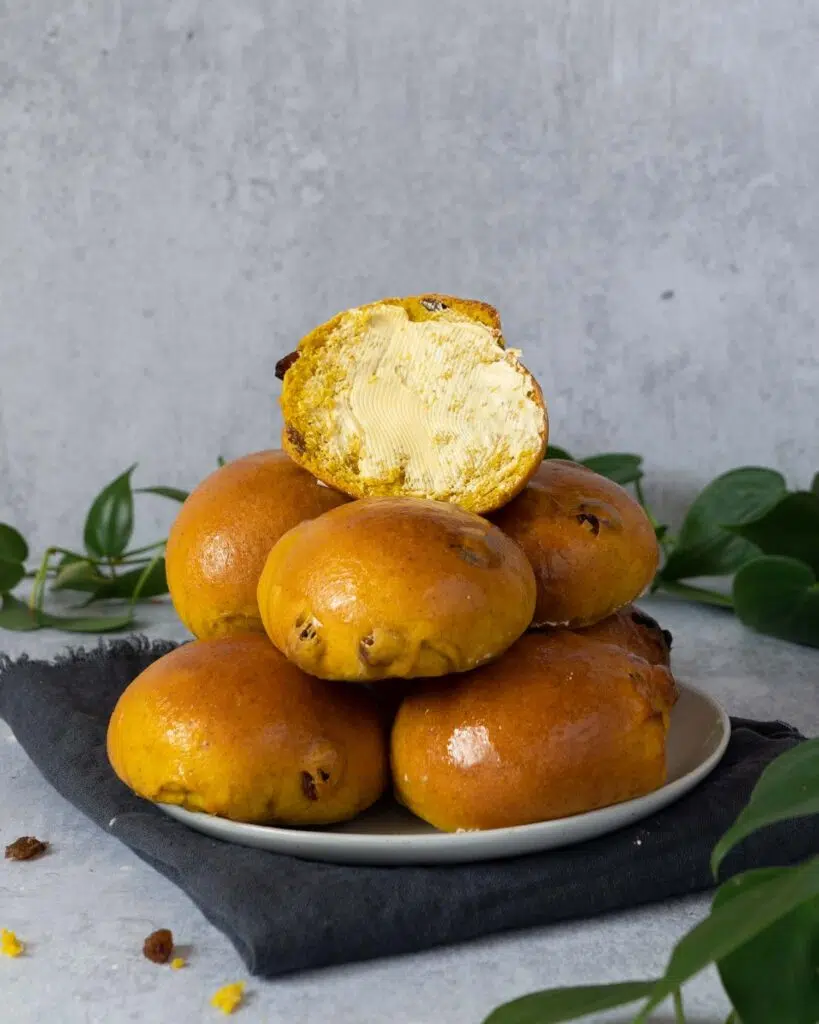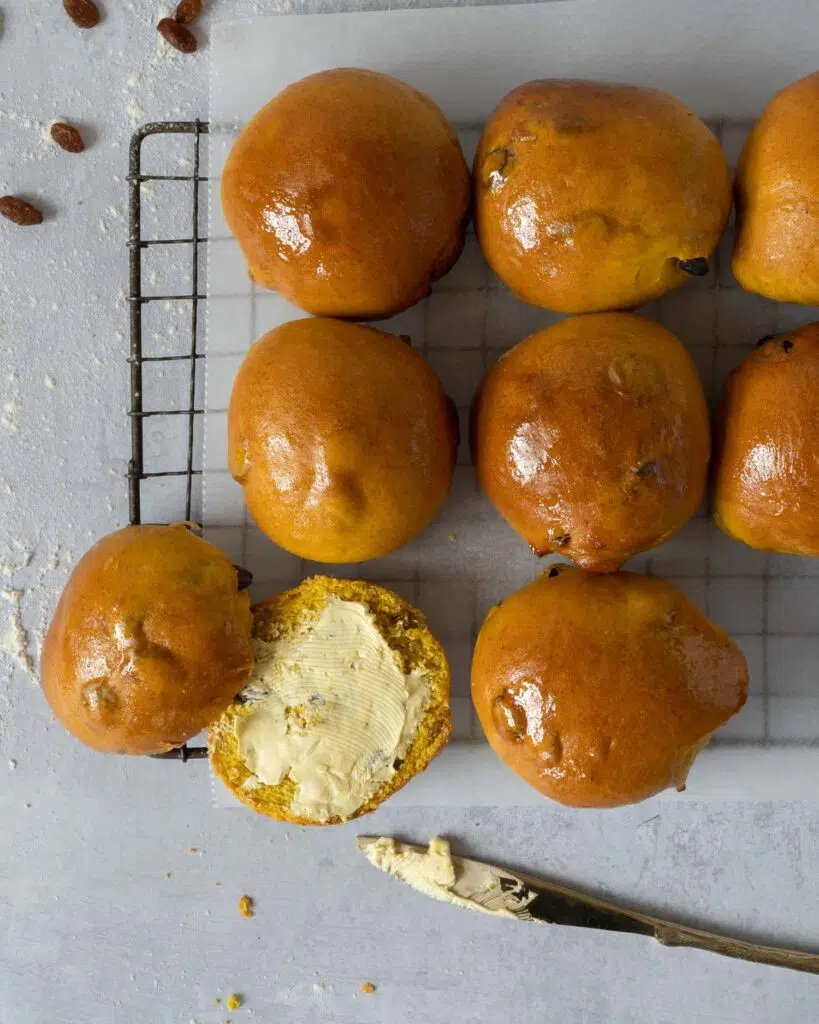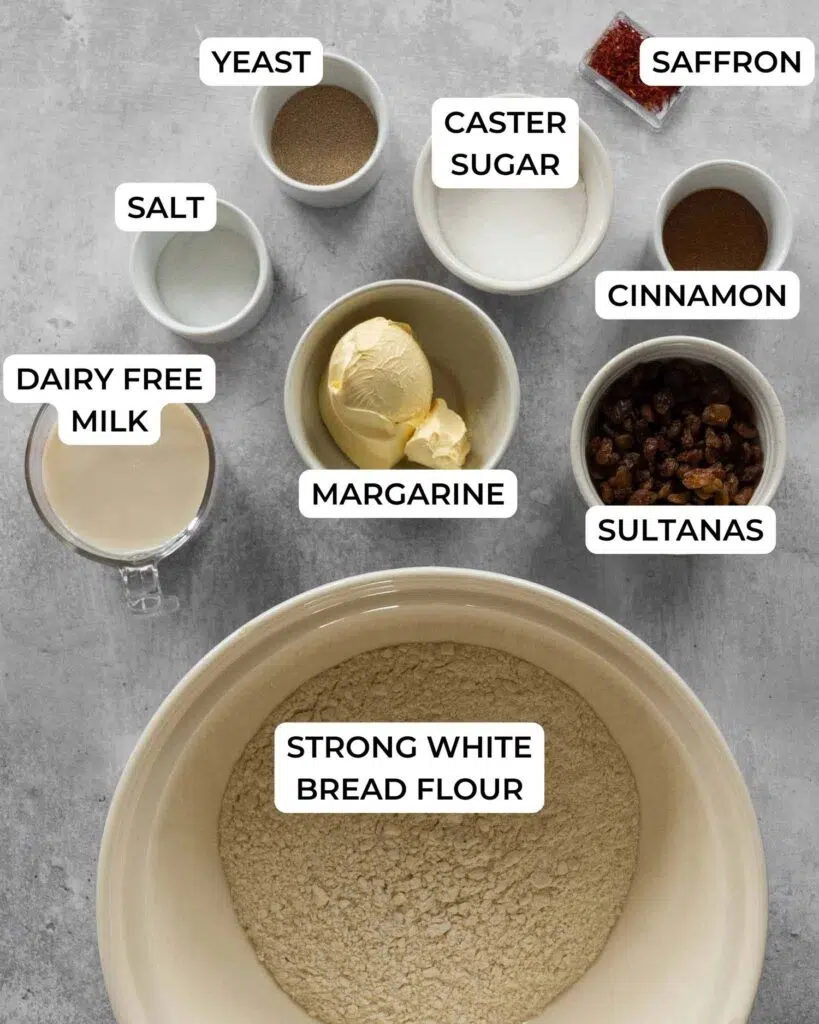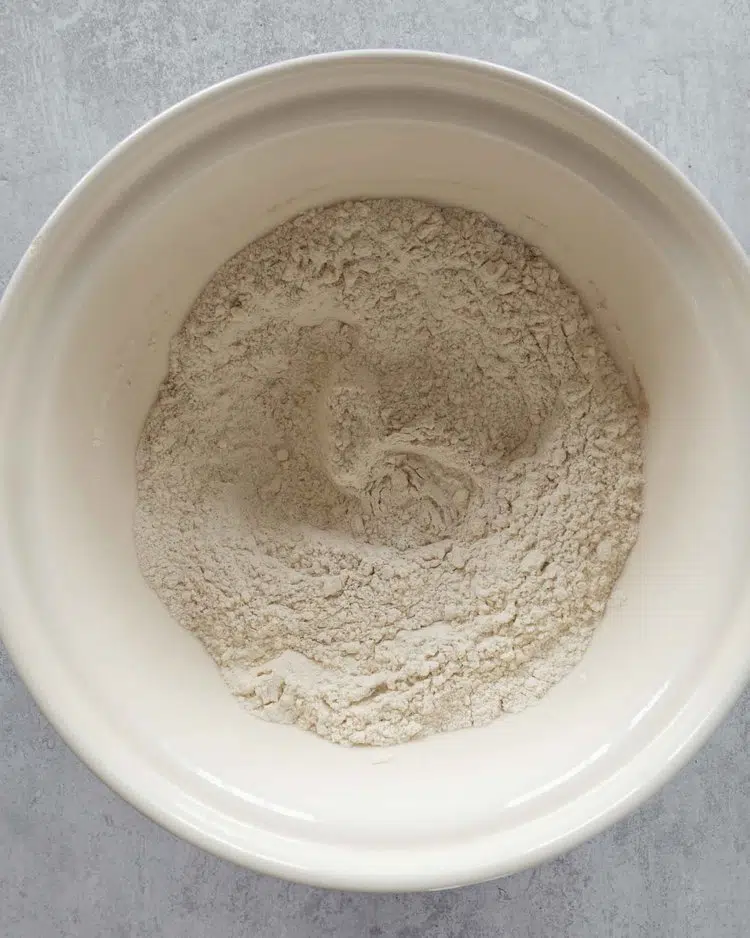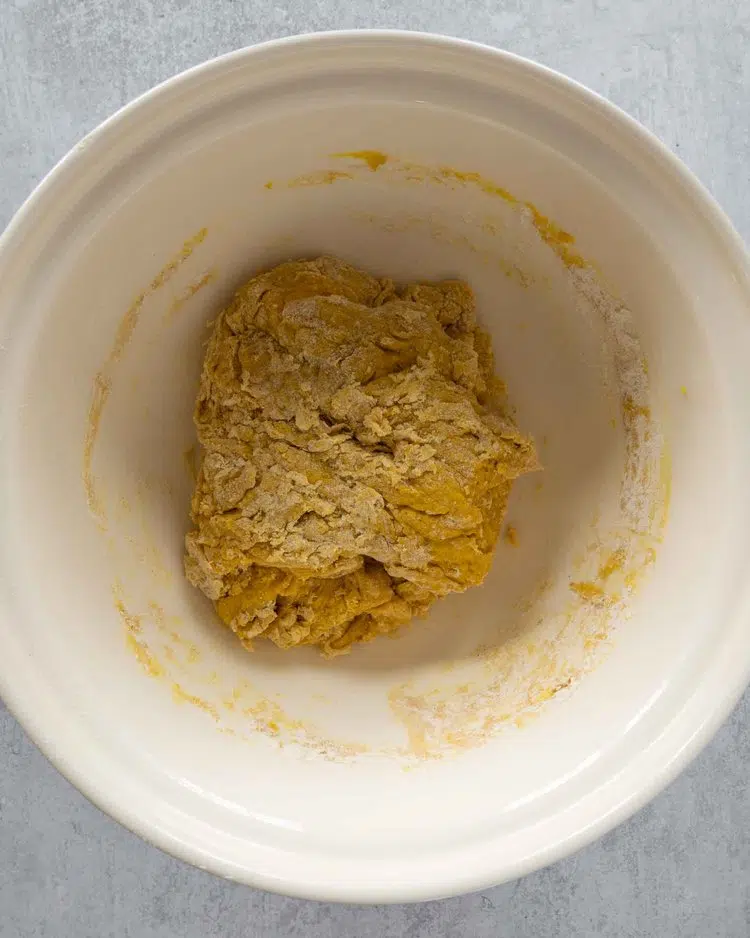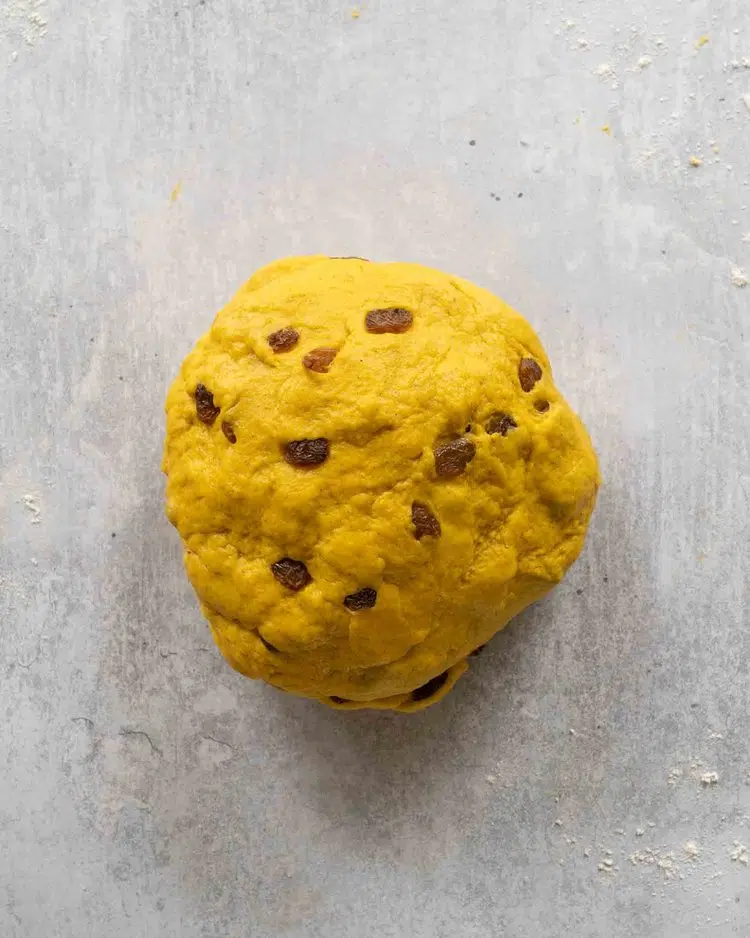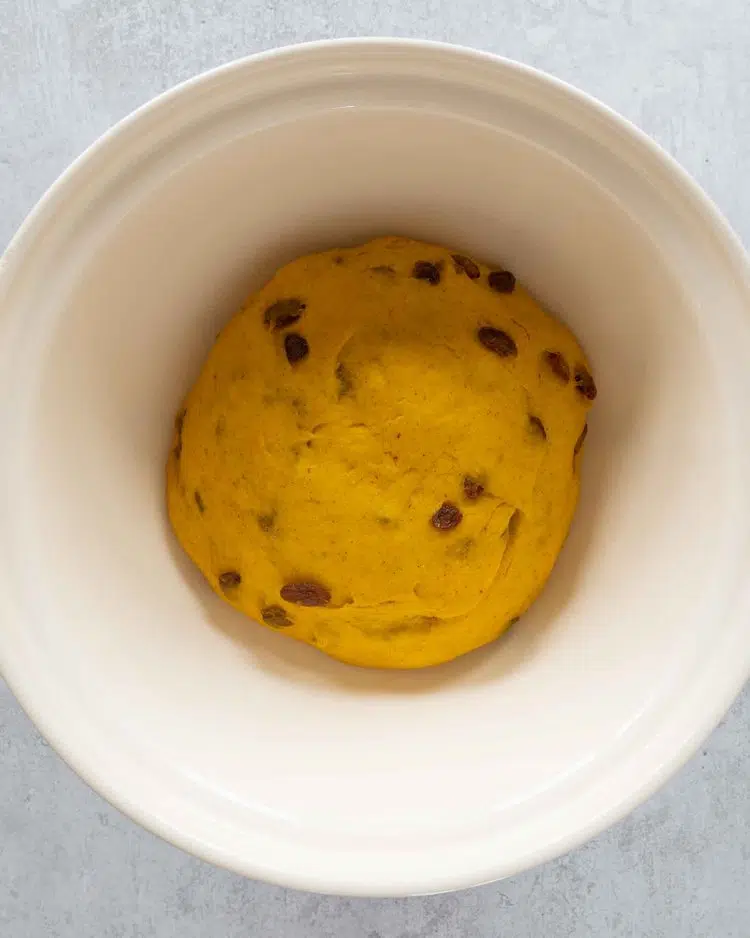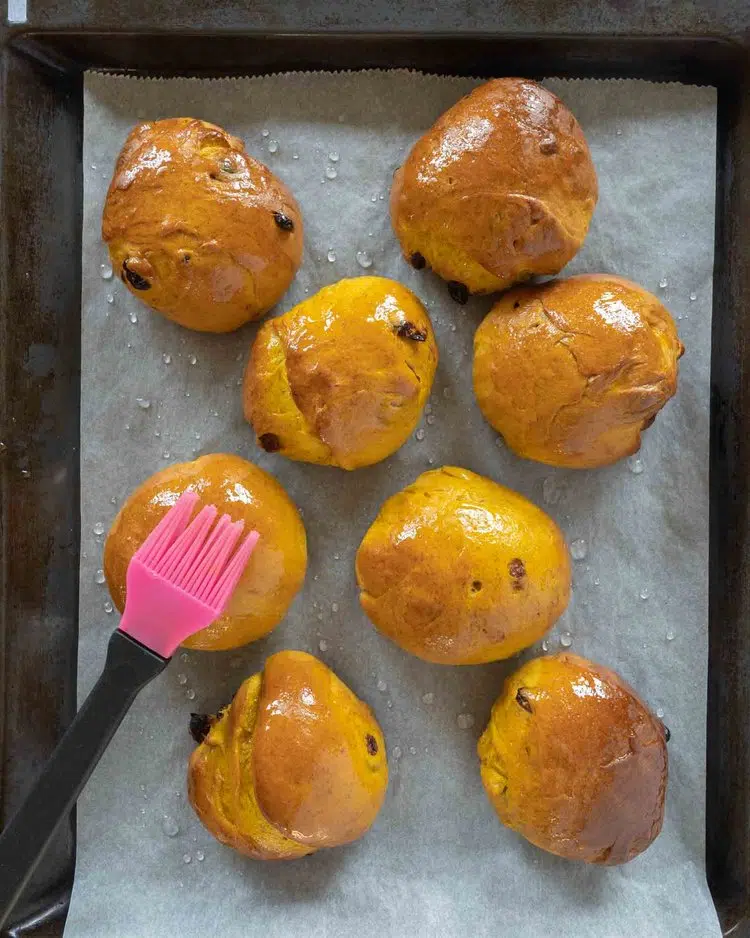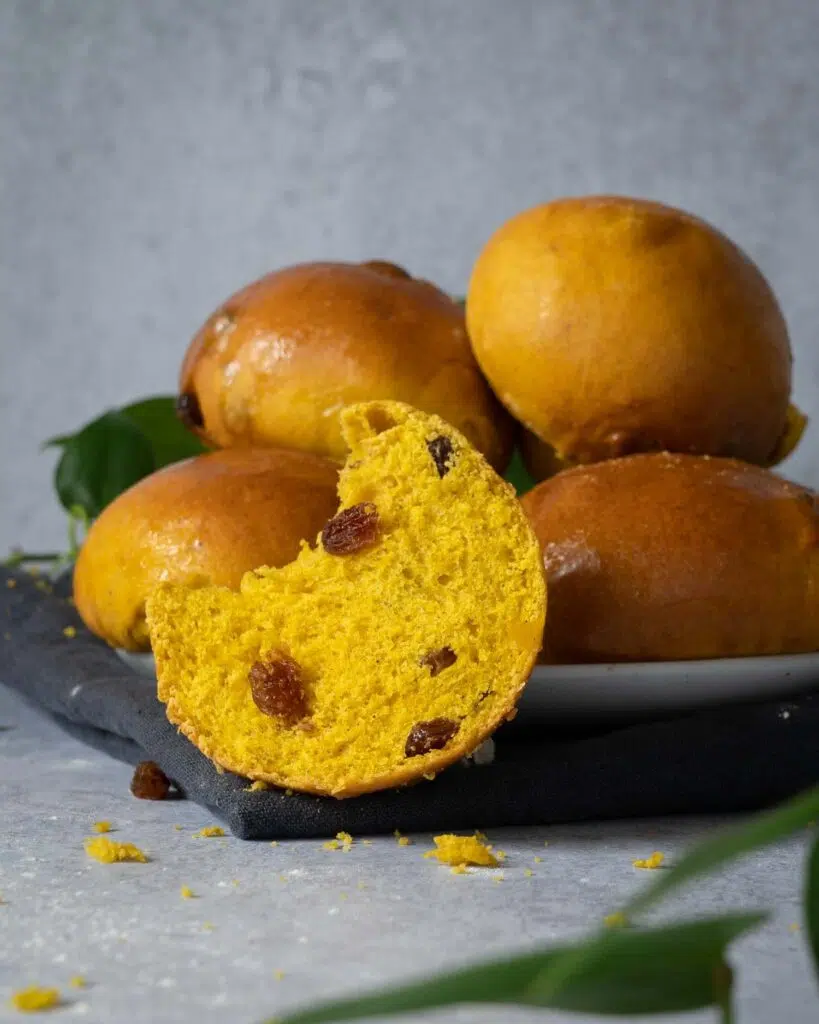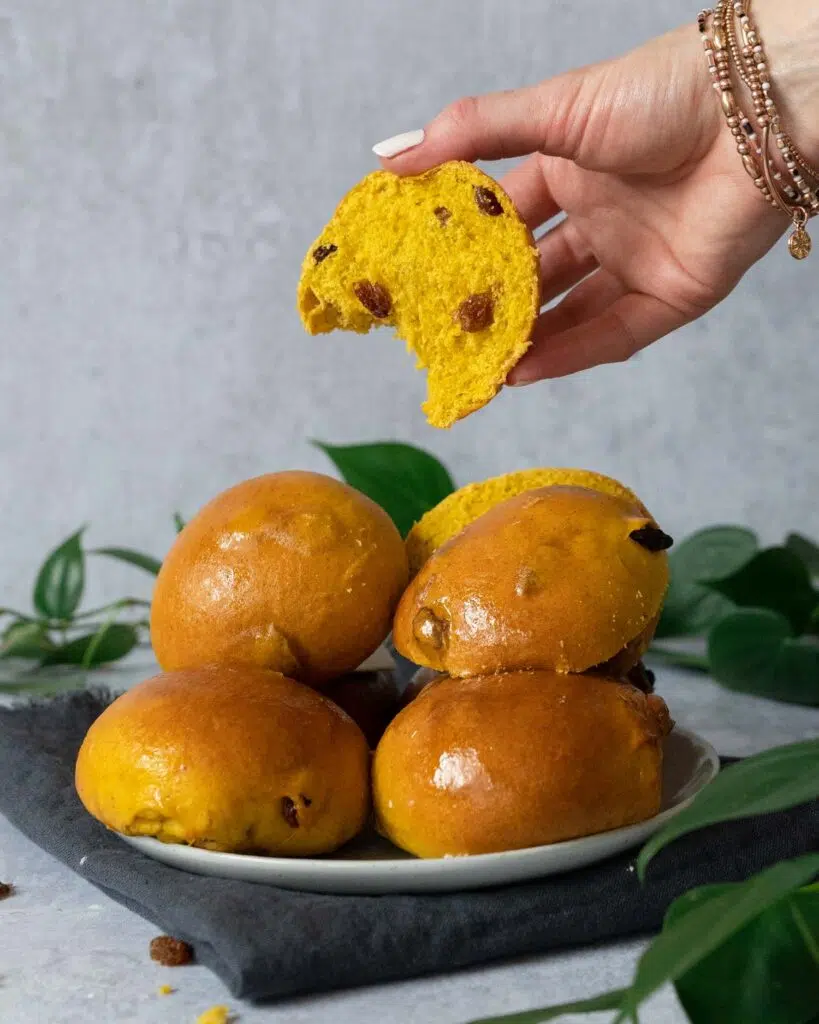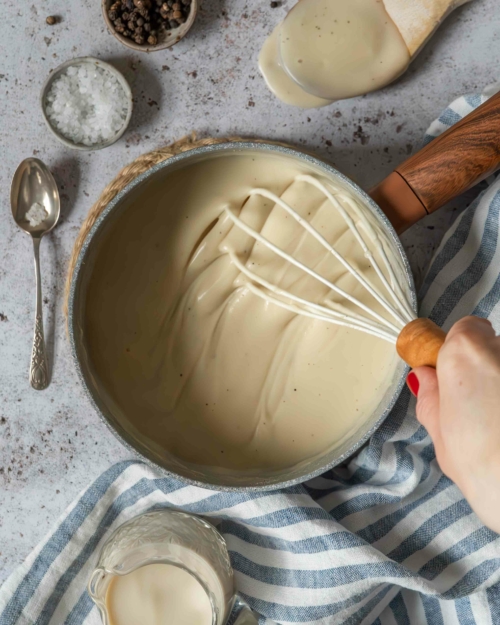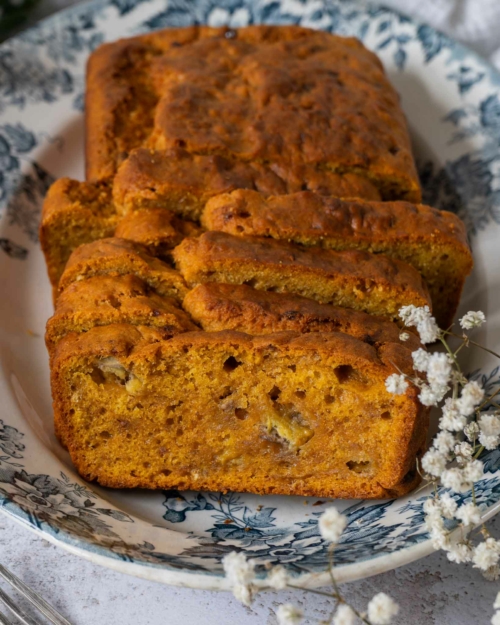These vegan Cornish Saffron Buns have been described as “the best Saffron Buns I’ve ever tasted” by multiple Cornish men and women during testing! They are soft and squishy on the inside with a delicate sweetness and unique saffron flavour. Filled with juicy sultanas and brushed with a sticky sugar glaze, this traditional Cornish treat is delicious served warm with melty vegan butter or just as they are.
As a Cornish lass through and through I frequently enjoyed a saffron bun as a child, baked fresh by my Ma (a chef and keen baker – lucky me!). They are eaten regularly in Cornwall and the West Country but are a bit of a mystery to those who live further afield.
These soft and squishy buns resemble a fruity bread roll but taste very different. They’ve got a delicate sweetness to them and the saffron adds a unique flavour, along with the classic bright yellow colour. They are so delicious, you simply must try them!
Quick links:
Why you’ll love these Cornish Saffron Buns
For their unique flavour. There is nothing quite like a saffron bun – if you’re Cornish or have Cornish relatives, these will go down a storm as a gift and if you’re not, you’ll be introducing your friends and family to a new sweet treat that they’ll want to enjoy over and over again!
They’re not too sweet. Many cakes and sweet baked goods are packed full of sugar but these buns instead have a delicate sweetness that isn’t going to leave you feeling like you’ve overdone it on the sugar front.
Just 10 simple ingredients. Saffron is the only ingredient you may not already have in your pantry – the other 9 are pantry and fridge staples that you’re likely to already have on hand (water, flour, sugar, margarine, dried yeast etc!).
They can be enjoyed hot or cold. These buns taste wonderful cold on the day they are made but equally as delicious lightly toasted with a slick of vegan butter the next day.
You can freeze them. Slice any spares in half and pop them in an airtight container in the freezer. You can then enjoy them toasted with butter when a sweet craving hits – a bit like a toasted tea cake!
Saffron boasts many health benefits. Saffron is believed to have antioxidant properties and health benefits including boosting mood, fighting oxidative stress and aiding the digestive system to name but a few (source).
How to make these vegan Cornish Saffron Buns
Saffron buns are easy to make but do require some down time to allow the yeast to prove and the dough to rise so it’s best to start early in the day.
First up, gather together your ingredients.
Step 1: First you’re going to gently bake and then grind the saffron.
Step 2: Next you will stir the ground saffron into some hot milk. Steps 1 and 2 help to release as much flavour as possible from this delicate and precious spice.
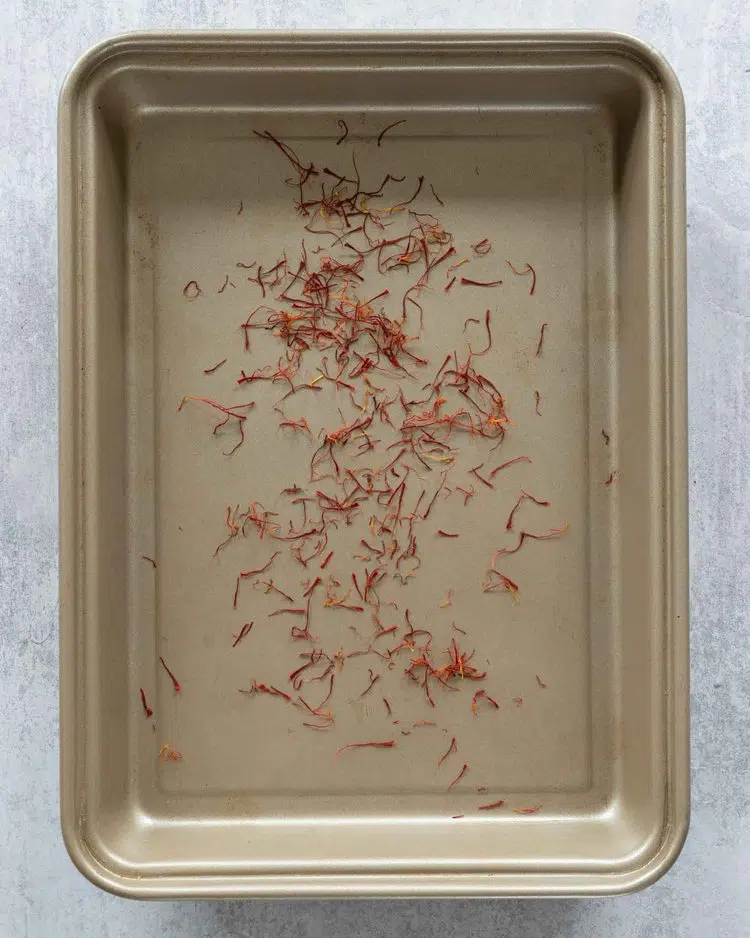
Step 3: I always recommend proofing your yeast to make sure it is active before adding it into the recipe, this extra 10 minutes is well worth it in my opinion to avoid wasted ingredients from inactive yeast! To ‘proof’ you add the yeast to a jug with some warm water and a tsp of sugar and leave it to froth up for 5-10 minutes.
Step 4: Stir melted butter into the saffron milk to combine.
Step 5: In a large mixing bowl, stir together the flour, 60g sugar, cinnamon and salt.
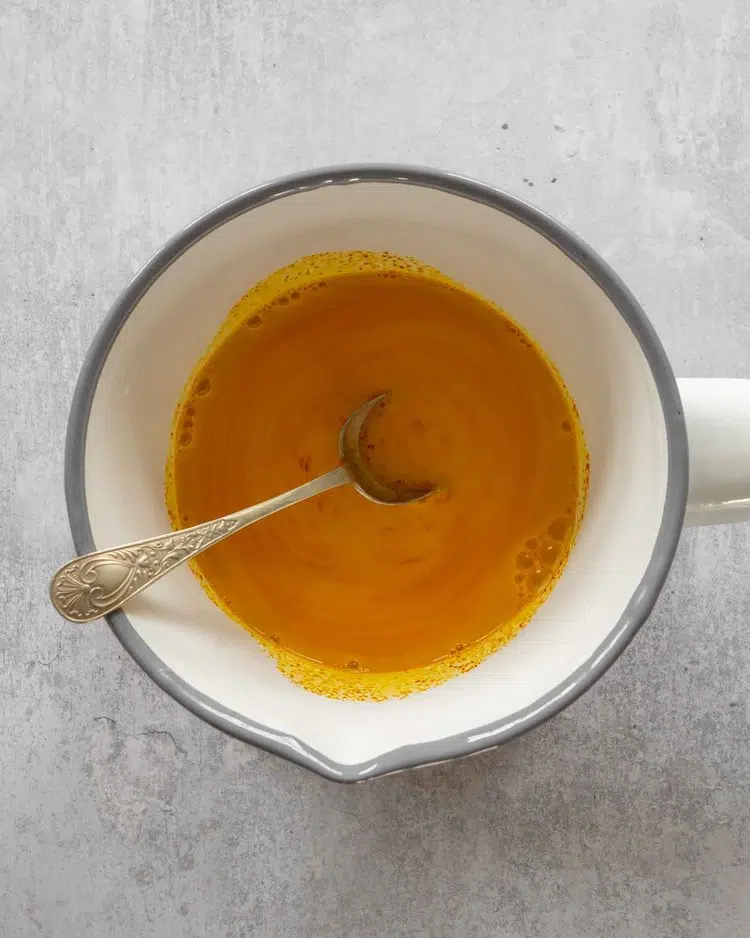
Step 6: Add the saffron milk/butter mixture and the frothy proofed yeast mixture to the dry ingredients.
Step 7: Stir everything together and then knead the dough for 7 minutes until soft and smooth.
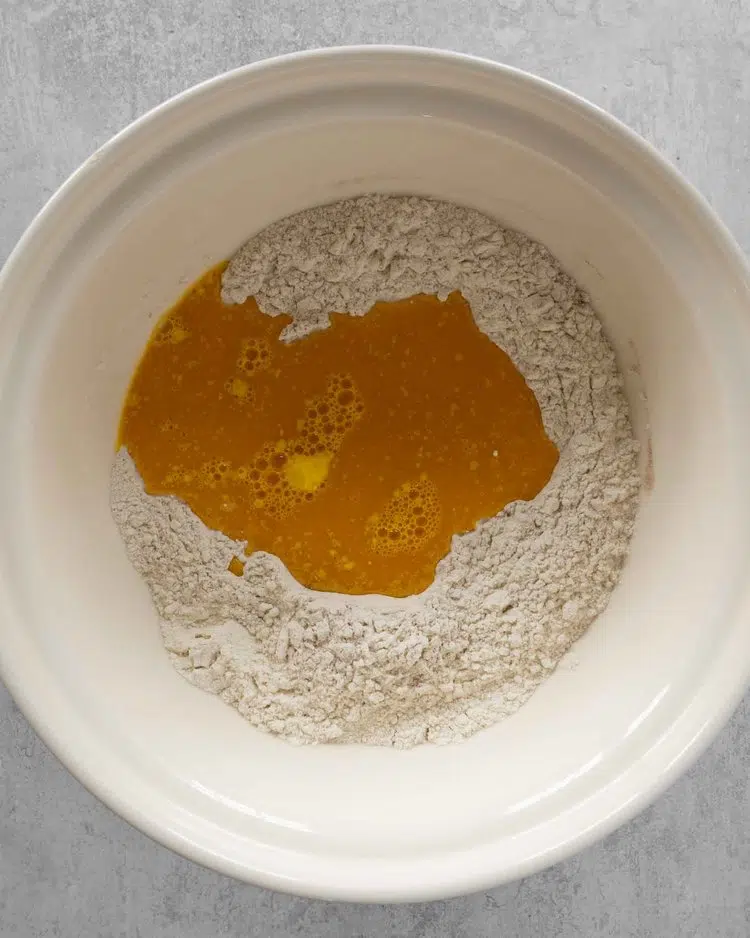
Step 8: Add the sultanas and knead for a further 2 minutes.
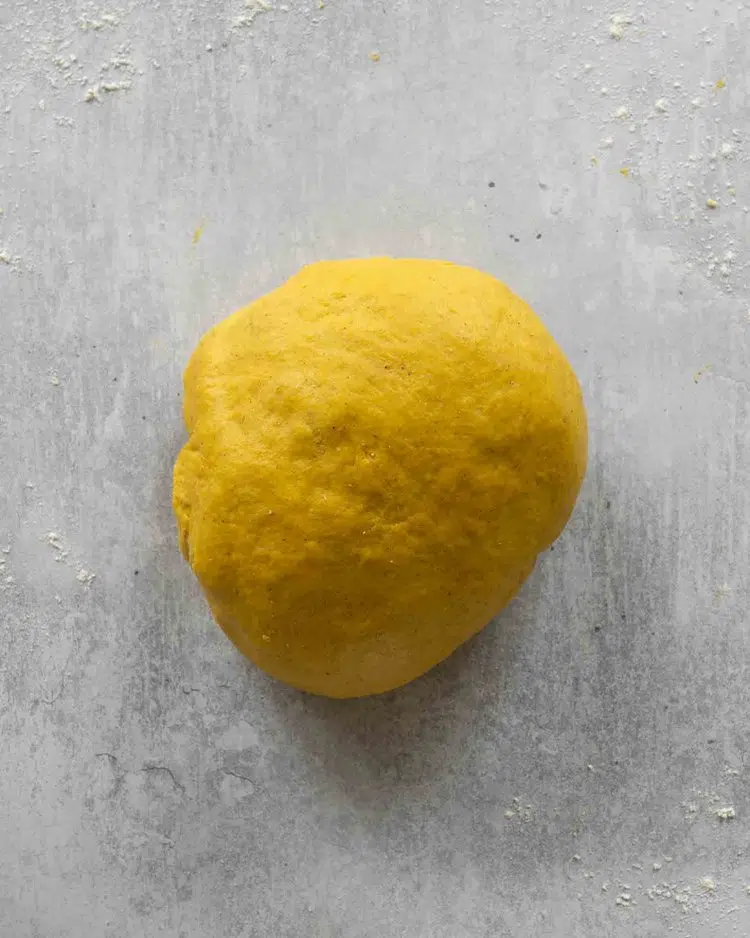
Step 9: Leave the dough to prove until double in size (1.5 – 2 hours)
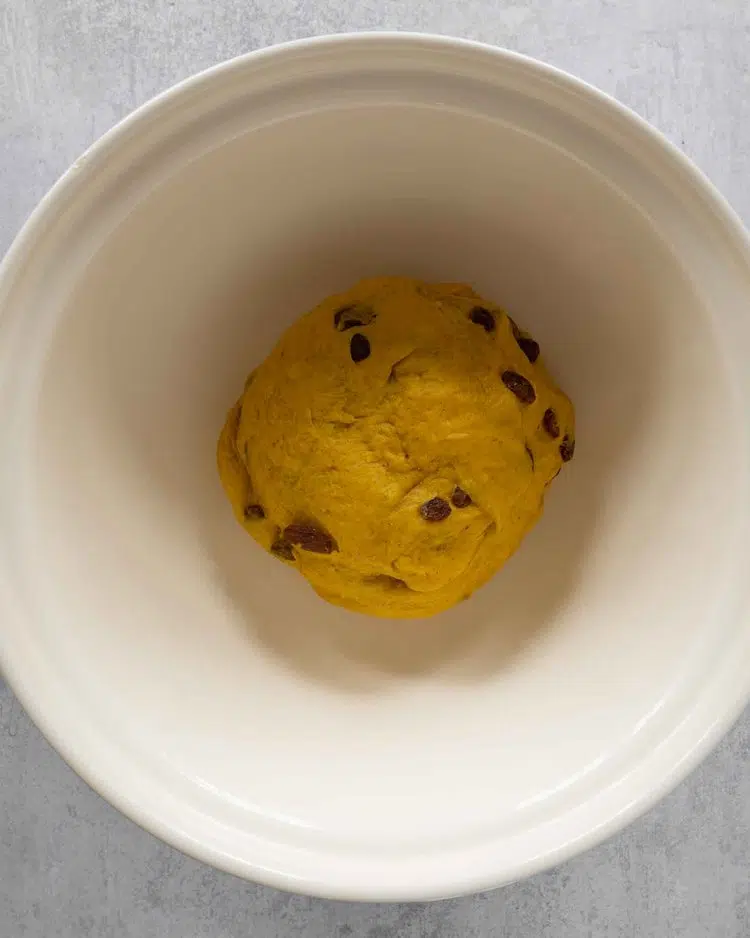
Step 10: Divide the proved dough into 8 balls and place on a baking tray. Leave to prove for another 30 minutes.
Step 11: Bake the buns in a preheated oven for 18 minutes until golden.
Step 12: Brush the buns with your sugar syrup as soon as they are out of the oven.
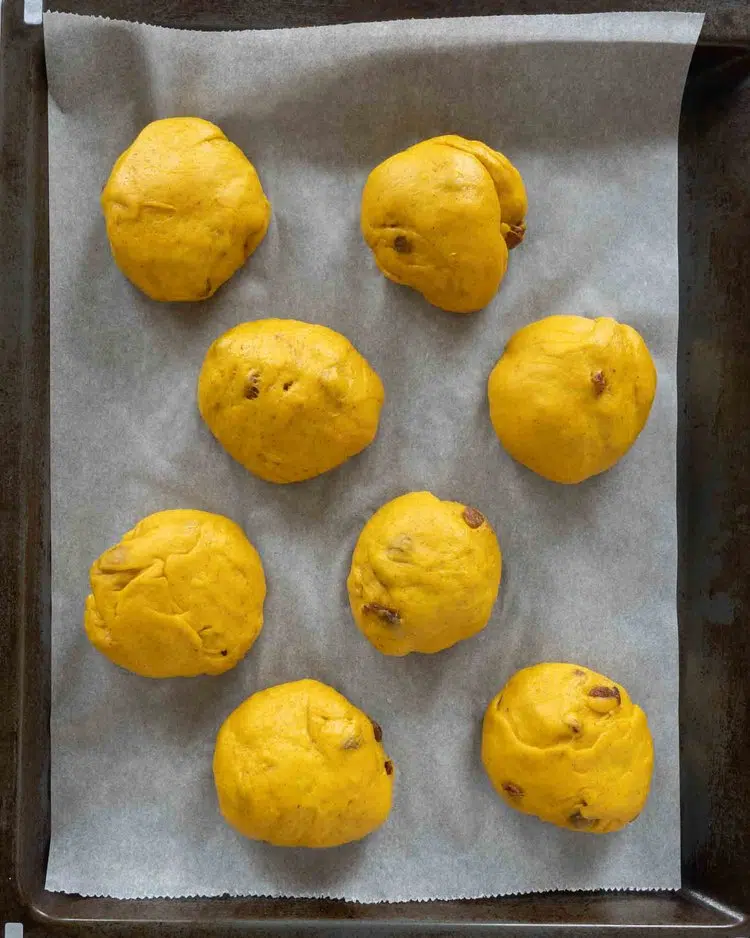
Top tips
-
Weighing your ingredients: Always use a scale to weigh your ingredients. This is the one that I use which is affordable and has been reliable and accurate.
-
Substitutes and variations:
-
Milk – this recipe has been tested with both soya and almond milk and both have worked well.
-
Sugar – you can use granulated white sugar instead of caster sugar if that is what you have on hand. I don’t recommend substituting with brown sugar.
-
Fruit – you can use raisins instead of sultanas if you prefer.
-
Flour – I have not tried this recipe with any flour other than strong white bread flour. Whilst I imagine you can make these buns gluten free, you may lose the soft squishiness so I couldn’t recommend it before having tested it myself.
-
Recipe size – This recipe can be doubled if you want to make a bigger batch of buns (I have done this myself for Mother’s Day gifts!). I would not recommend halving the recipe.
-
-
Give yourself time: Saffron buns are easy to make but do require some down time to allow the yeast to prove and the dough to rise so it’s best to start early in the day.
-
Proofing your yeast: I always recommend proofing your yeast to make sure it is active before adding it into the recipe, this extra 10 minutes is well worth it in my opinion to avoid wasted ingredients from inactive yeast!
-
Giving your dough time to rise: Dough with spices and fruit in it typically takes longer to rise so you need to allow ample time for your dough to double in size. In a warm kitchen this could take 1.5 hours, in a slightly cooler kitchen it may be 2 hours or more. Make sure you find a warm (but not hot) spot to prove the dough.
-
Storing: Once cool, store your saffron buns in an airtight container.
-
Serving: Saffron buns are best enjoyed fresh the same day as baking but are still good the next day. They’re actually very nice lightly toasted with a slick of melty vegan butter so if you’re eating them the next day I’d recommend trying this.
FAQs
-
Can I freeze them? Saffron buns are best enjoyed fresh but you can freeze them if you end up with spares. I’d recommend slicing them in half before freezing and then serving them toasted with vegan butter as and when you fancy!
-
How long do they last? Store them in an airtight container and enjoy them fresh on day 1 or toasted on day 2.
-
Can I make them gluten free? I have not tried this so I cannot recommend making them gluten free at this stage. If you try it please do let me know though!
-
Can I double or half the recipe? Yes you can double the recipe for a bigger batch but I would not recommend halving the recipe.
This post may contain affiliate links, which means that I may make a small commission off of items you purchase via one of these links, at no additional cost to you. Please read the policy page for more information.
Loved these Cornish Saffron Buns? Here are some more delicious vegan sweet treats and Cornish recipes to try
-
One of the most popular recipes on the blog, these Proper (Vegan) Cornish Pasties are absolute monsters and have multiple 5* reviews!
-
If you’re a fan of fruity, spiced treats, these Vegan Welsh Cakes should be right up your street (and they’re ready in under half an hour).
-
These Healthy Millionaire’s Shortbread are gluten free and made with natural, wholesome ingredients but you wouldn’t know it – they taste very naughty indeed.
-
Another popular Cornish sweet treat – the scone! Serve these Fruity Lemonade Scones the Cornish way with jam on the bottom and whipped vegan cream on the top.
-
Scrumptious warm Cinnamon Raisin Oat Cookies dipped in glass of oat milk? Don’t mind if I do! They’re easy peasy to make too.
I hope you LOVE these vegan Cornish Saffron Buns! Share this recipe with someone you think will love it and don’t forget to tag @aveganvisit on social media when you try out the recipe – I absolutely love seeing your re-creations! Enjoy 🙂 x
If you make this recipe, please leave a comment and star rating below – this provides helpful feedback to both me and other readers. If you want more delicious vegan recipes be sure to subscribe to the A Vegan Visit newsletter and join the AVV community on Instagram, Pinterest, Facebook, Twitter and Tiktok.
The Video Recipe:
The Cornish Saffron Bun Recipe:
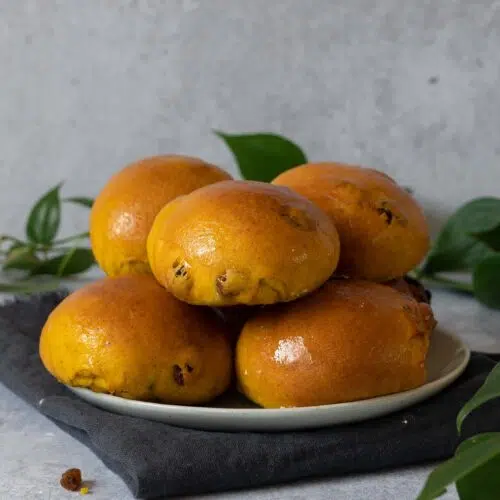
Cornish Saffron Buns
Ingredients
For the buns:
- 1 x 0.5g jar saffron strands
- 200 ml dairy free milk (unsweetened - soya or almond work well)
- 50 ml dairy free milk (unsweetened - soya or almond work well)
- 1 x 7g sachet dried instant yeast
- 1 tsp caster sugar
- 140 g dairy free margarine (melted)
- 500 g strong white bread flour (plus extra for dusting)
- 60 g caster sugar
- 1 tsp ground cinnamon
- 1 tsp salt
- 100 g sultanas (substitute: raisins)
For the sugar glaze:
- 3 tbsp caster sugar (approx 50g)
- 3 tbsp hot water
Instructions
- Preheat the oven to 100°C fan (120°C conventional / 250°F / gas mark 1/2).
- Spread the saffron strands out on a baking tray and bake them for 20 minutes. Once baked, grind the saffron into a powder. This helps to release as much flavour as possible.1 x 0.5g jar saffron strands
- Warm 200ml of the milk in a saucepan until it is steaming. Remove it from the heat and stir in the powdered saffron. Set it aside, off of the heat, to infuse for 20 minutes.200 ml dairy free milk
- Warm the remaining 50ml milk gently in the microwave or a pan until it is around 40°C (100°F) (approx 15 seconds in the microwave). Note: If you don’t have a thermometer, you can do the ‘finger test’ - at 40°C (100°F) it should feel neither warm nor cold to the touch when you dip your finger into it (i.e. it’s more or less the same as your body temperature).50 ml dairy free milk
- Add the 50ml of warm milk to a jug with the yeast and 1 tsp caster sugar, stir and set it aside for 10 minutes to froth up.*1 x 7g sachet dried instant yeast, 1 tsp caster sugar
- Add the melted butter to the saffron milk and stir together. Let the liquid cool to 40°C (100°F), which should be fairly soon after adding the butter to the milk. Don’t be tempted to use it when it is hotter than this as it could kill the yeast.140 g dairy free margarine
- In a large bowl stir together the flour, 60g sugar, cinnamon and salt.500 g strong white bread flour, 60 g caster sugar, 1 tsp ground cinnamon, 1 tsp salt
- Make a well in the flour mixture and pour in the saffron milk and margarine mixture along with the jug of frothy yeast.
- Stir it together and then bring it together into a dough. Transfer the dough to a lightly floured surface and knead for 7 minutes until the dough is soft and smooth like bubblegum.
- Add the sultanas to the dough in stages and continue kneading for another 2 minutes to incorporate and evenly spread the sultanas throughout the dough.100 g sultanas
- Place the dough in a bowl, cover it and leave it in a warm place to prove until it has doubled in size. Depending on the warmth of your kitchen this should take between 1.5 - 2 hours. Note: The proving of this dough takes a little longer than other doughs, such as bread dough, due to the spices and fruit.
- Turn the dough out onto a lightly floured surface. Divide it into 8 sections and roll them between your hands to make balls. Place the dough balls on a lined baking tray, spread out, and set the tray aside somewhere warm to prove again for 30 minutes. Note: If you want your buns to be more uniform in size you can weigh the dough out - you should have approximately 8 x 120g.
- Preheat the oven to 180°C fan (200°C conventional / 400°F / gas mark 6) and then bake the buns for 18-20 minutes until they are golden on top.
- Add 3 tbsp of boiling water to a small dish with 3 tbsp of caster sugar and stir together for 30 seconds until the sugar has dissolved. Note: If you want a super smooth glaze on the buns then you can add the water and sugar to a small saucepan and simmer for a minute.3 tbsp caster sugar, 3 tbsp hot water
- As soon as the buns are out of the oven, brush them with the glaze.
- Place the buns on a cooling rack to cool.

